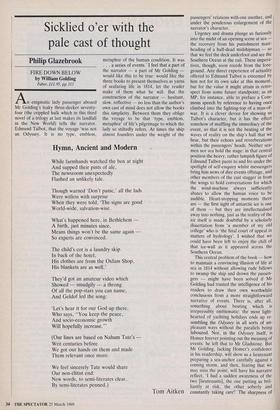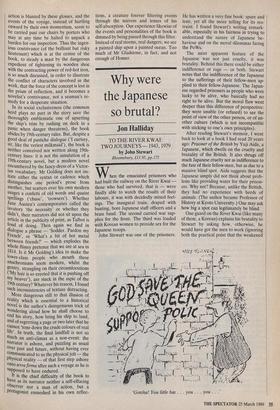Sicklied o'er with the pale cast of thought
Philip Glazebrook
FIRE DOWN BELOW by William Golding Faber, £11.95, pp.3I3 An enigmatic lady passenger aboard Mr Golding's leaky three-decker seventy- four (the crippled hulk which in this third novel of a trilogy at last makes its landfall in the New World) tells the narrator, Edmund Talbot, that the voyage 'was not an Odyssey. It is no type, emblem, metaphor of the human condition. It was . . . a series of events.' I feel that a part of the narrator — a part of Mr Golding — would like this to be true: would like the three books to present themselves as yarns of seafaring life in 1814, let the reader make of them what he will. But the construction of the narrator — hesitant, slow, reflective — no less than the author's own cast of mind does not allow the books this simplicity. Between them they oblige the voyage to be that 'type, emblem, metaphor' of life's pilgrimage to which the lady so stiltedly refers. At times the ship almost founders under the weight of the
passengers' relations with one another, and under the ponderous enlargement of the narrator's character.
Urgency and drama plunge us furiously into the midst of an opening scene at sea — the recovery from his punishment mast- heading of a half-dead midshipman — so that we feel the deck underfoot and see the Southern Ocean at the rail. These impera- tives, though, soon recede from the fore- ground. Any direct experience of actuality offered to Edmund Talbot is esteemed by him not for its own sake at this moment, but for the value it might attain in retro- spect from some future standpoint; as an MP, for instance, able to preface a Com- mons speech by reference to having once climbed into the fighting-top of a man-of- war. It is a clever device for showing us Talbot's character, but it has the effect somehow of muffling the immediacy of the event, so that it is not the beating of the waves of reality on the ship's hull that we hear, but their echoes and reverberations within the passengers' heads. Neither sea- men nor sea hold the stage: in that central position the heavy, rather lumpish figure of Edmund Talbot paces to and fro under the spotlight of self-enquiry whilst messengers bring him news of dire events offstage, and other members of the cast stagger in from the wings to hold conversations for which the wind-machine always sufficiently abates to allow the human voice to be audible. Heart-stopping moments there are — the first sight of antarctic ice is one of them — but they are intellectualised away into nothing, just as the reality of the ice itself is made doubtful by a scholarly dissertation from 'a member of my old college' who is 'the final court of appeal in matters of hydrology'. I wished that we could have been left to enjoy the chill of that ice-wall as it appeared across the Southern Ocean.
This central problem of the book — how to maintain a convincing illusion of life at sea in 1814 without allowing rude billows to swamp the ship and drown the passen- gers — might have been solved if Mr Golding had trusted the intelligence of his readers to draw their own worthwhile conclusions from a more straightforward narrative of events. There is, after all, something about boating which is irrepressibly emblematic: the most light- hearted of yachting holidays ends up re- sembling the Odyssey in all sorts of un- pleasant ways without the parallels being laboured. Nor, in the Odyssey itself, is Homer forever pointing out the meaning of events: he left that to Mr Gladstone. But Mr Golding, lacking Homer's confidence in his readership, will show us a lieutenant preparing a sea-anchor carefully against a coming storm, and then, fearing that we may miss the point, will have his narrator reflect, 'I had a sudden awareness of the two [lieutenants], the one putting us bril- liantly at risk, the other soberly and constantly taking care!' The sharpness of action is blunted by these glosses, and the events of the voyage, instead of hurtling onward by their own momentum, seem to be carried past our chairs by porters who may at any time be halted to unpack a burden for our inspection. Thus the ingen- ious contrivance (of the brilliant but risky lieutenant) which is at the centre of the book, to steady a mast by the dangerous expedient of tightening its wooden shoe With the contracting power of red-hot iron, is so much discussed, in order to illustrate the conflict of characters involved in the work, that the force of the concept is lost in the prism of reflection, and it becomes a novelist's contrivance, not a seaman's re- medy for a desperate situation.
In its social exclusiveness (the common herd plays no part in the story save the thoroughly emblematic one of upsetting the ship's trim by rushing on deck in a panic when danger threatens), the book abides by 19th-century rules. But, despite a good deal of pastiche dialogue CI curtsey, sir, like the veriest milkmaid'), the book is neither conceived nor written along 19th- century lines: it is not the simulation of a 19th-century novel, but a modern novel encumbered by the fancy-dress of a Victor- ian vocabulary. Mr Golding does not im- itate either the syntax or cadence which distinguishes one period's prose from another, but scatters over his own modern usages a confetti of old words and quaint Spellings ('chuse', `trowsers'). Whether Jane Austen's contemporaries called the lavatory 'the necessity' or whether they didn't, their narrators did not sit upon the article in the publicity of print, as Talbot is fond of doing. Then again we find in dialogue a phrase — `Sodder. Pardon my French', or 'What's a bit of hot metal between friends?' — which explodes the Whole flimsy pretence that we are at sea in 1814. Is it Mr Golding's idea to make the lower-class people who mouth these anachronisms seem modern, whilst the gentry, strangling on their circumlocutions (`My hair is so erected that it is pushing off fly beaver'), are stuck in the aspic of the 19th century? Whatever his reason, I found such inconsistencies of texture distracting. More dangerous still to that illusion of reality which is essential to a historical novel is the author's disingenuous trick of wondering aloud how he shall choose to end his story, how bring his ship to land, and of regretting a page or two later that he cannot 'tone down the crude colours of real life'. In truth, the final landfall is not so much an anti-climax as a non-event: the narrator is ashore, and puzzling as usual over past and future, without having ever communicated to us the physical jolt — the Physical reality — of that first step ashore onto terra firma after such a voyage as he is supposed to have endured.
It is the chief difficulty of the book to have as its narrator neither a self-effacing Observer nor a man of action, but a protagonist enmeshed in his own reflec- tions, a creature forever filtering events through the mirrors and lenses of his self-absorption. Our experience likewise of the events and personalities of the book is dimmed by being passed through this filter. Instead of real storms, real dangers, we see a painted ship upon a painted ocean. Too much of Mr Gladstone, in fact, and not enough of Homer.



















































 Previous page
Previous page